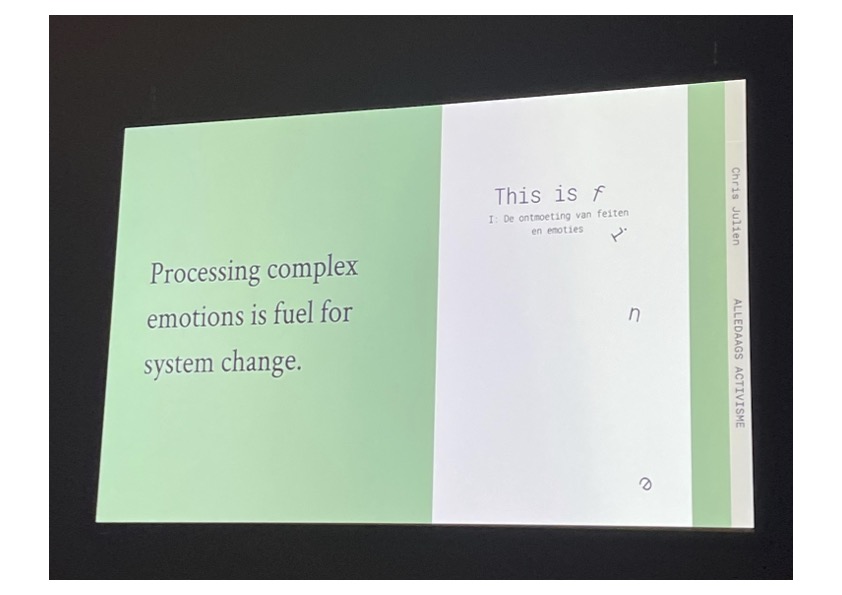Documentation
“Social Justice and Embodiment: Research or Activism?” – Mila Narjollet

Still from Chris Julien’s seminar for Transmission in Motion, 13th November 2024, Muntstraat 2A, Utrecht.
As someone studying artistic research – what it is, how it operates, to what ends – I often find myself curious about the invisible line that seems to have been drawn between artistic research and activism. To what extent can a practice that is developed with the intention of disrupting ideas, processes or systems, one based on theories of social justice, embody this dirsuption? To what extent does it in fact simply translate the complexities of a given issue? When it comes to artistic research, is it relevant to compare it to direct action and, in case of the affirmative, what is the significance of the gap between the two?
“Processing complex emotions is fuel for system change” (Julien 2024). This sentence, written across one of Julien’s slides towards the middle of his lecture struck me as being of the utmost importance. Emotion and affect have currently no legitimacy in academic research, it is not considered a tool or an end to appeal to. But in artistic research, intuition and feeling can be powerful sources of knowledge production. They have the potential to personalize and create nuance in discourse that often seeks to typify and generalize. Perhaps the very effort of corroding the rigidity of academic knowledge and meaning making, the attempt to create new points of departure for research and new narratives to receive it by, have their value in the scheme of a global effort towards social justice.
Camille Sapara Barton, an artist, writer and somatic practitioner based in Amsterdam blurs the line between theories of social justice and an artistic practice through care and grief work. During a panel discussion and interview for FIBER Festival in Amsterdam, they stressed the importance of embodied ethics within the medical sector, in pedagogy and in artistic praxis to create what Sapara Barton calls livable futures, “futures that are going to support the web of life, support as many beings as possible to thrive and to live in an abundant and nourishing way” (Sapara Barton 2024). Through works like The SanQtuary (2018-2022) and directing Emergent Bass in Berlin (2020-2024) Sapara Barton engages in the embodiment of ecological and ontological discourses through artistic practice by operating in spaces outside of the gallery or the museum (Sapara Barton 2024). They import processes of care such as somatic practices, harm reduction, meditation and the healing properties of sound and movement to social spaces, particularly nightlife, to access the tangible and direct quality of social work. In this sense Sapara Barton creates spaces which foster the processing of complex emotions, the internal alchemy necessary for system change.
Chris Julien proposes that the distinction itself, between art and activism, life and activism, might be the reason that these kind of practices remain a minority. Julien’s talk stressed that not only are we all activists in the sense that every action is an ethical one, but that our very cells are designed to understand disordered systems and adapt to them. As Julien reminds us, there are systems and discourses at play which convince us that we are under-qualified, unknowing and out-powered when it comes to system change. That it is in fact not necessary to fully understand a system in order to approach it, nor are large disruptions necessary to enact change (Julien 2024). Perhaps the question must be turned outwards: what is preventing artists (and non-artists alike) in the West from engaging more directly with social justice and the embodiment of their ethics?
References
Julien, Chris. 2024. “Transversality, Collapse and Everyday Activism.” Utrecht, NL: Utrecht University.
Sapara Barton, Camille. 2024. “Careful Encounters – New Forms of Collectivity for Sharing Healing Experiences.” Amsterdam, NL: FIBER Festival.
Sapara Barton, Camille. 2024. “Camille Sapara Barton on Grief and Livable Futures.” Interview by Mila Narjollet. FIBER Festival. June 6.

